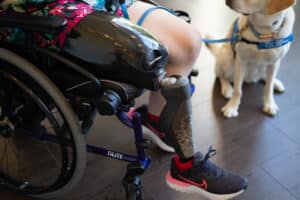
Representing a significant breakthrough for above-knee amputees, the proposed Local Coverage Determination (LCD) announced on Thursday, January 18, seeks to expand access to microprocessor-controlled knee (MPK) technology for Medicare beneficiaries who have a K2 activity level.
Medicare Functional Classification Levels, or ‘K levels,’ are a rating system from 0 to 4 that determine an individual’s activity level. So far, only those individuals who had a K3 level or higher have qualified to receive microprocessor-controlled knees (MPK), so the proposed expansion of coverage to include K2 activity levels would have several benefits including offering many individuals increased safety and independence.
It’s important to note that your treating physician’s records, not your prosthetist, determine your K level and subsequently which prosthetic devices are deemed ‘medically necessary’ based on insurance coverage. However, the K level is not a permanent designation; if your functional ability changes over time through rehabilitation, your level may be adjusted. This is why routine visits with your healthcare team and updated medical records regarding your prosthetic and orthotic care are important.
Read about each level as defined by Medicare:
Level 4: The patient has the ability or potential for prosthetic ambulation that exceeds basic ambulation skills, exhibiting high impact, stress or energy levels. This is typical of the prosthetic demands of the child, active adult or athlete.
Level 3: The patient has the ability or potential for ambulation with variable cadence. A person at level 3 is typically a community ambulator who can traverse most environmental barriers and may have vocational, therapeutic, or exercise activity that demands prosthetic use beyond simple locomotion.
Level 2: The patient has the ability or potential for ambulation with the ability to traverse low-level environmental barriers such as curbs, stairs or uneven surfaces. This is typical of the limited community ambulator.
Level 1: The patient has the ability or potential to use a prosthesis for transfers or ambulation on level surfaces at fixed cadence. This is typical of a household ambulator or a person who only walks about in their own home.
Level 0: The patient does not have the ability or potential to ambulate or transfer safely with or without assistance and a prosthesis does not enhance their quality of life or mobility. This level does not warrant a prescription for a prosthesis.
As compared to other options for prostheses, MPK’s have significant safety advantages to prevent falls when descending stairs or walking across uneven terrain. “My prosthetist said a microprocessor-controlled prosthetic knee would probably cost me $8,000 out of pocket,” Kathy Crawford, who has an ability level K2, wrote on a recent AC Connect discussion thread. “I’ve [had to] conquer curbs at a very slow pace. I would not dream of trying stairs with the leg and knee I have now. I think this technology would make that [part-time job or volunteer position] a lot easier.” This proposed legislative change will further lift the financial barrier that has prevented people with a K2 activity level from accessing these devices.
The proposed LCD is now in the public comment period until March 2, 2024, so we encourage you to comment directly by emailing LLPLCDCOMMENTS@cgsadmin.com or email us your thoughts at advocacy@amputee-coalition.org.
Alternatively, you can mail your comments to:
MAC Medical Directors
26 Century Blvd Ste ST610
Nashville, TN 37214-3685
The Durable Medical Equipment Medicare Administrative Contractors (DME MACs) will host a virtual public meeting on Thursday, February 22. Registration is now open.
If you haven’t already, we invite you to join the discussion happening now in the Advocacy community on AC Connect!

